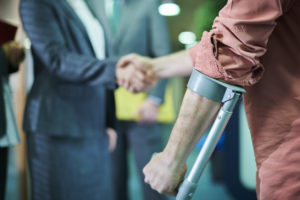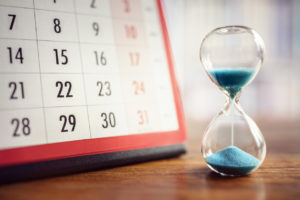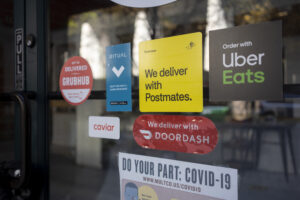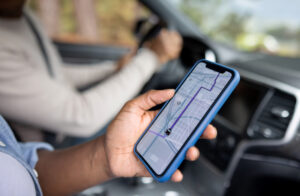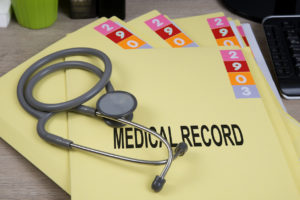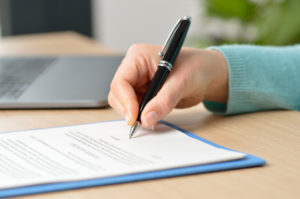Key Points:
- Under Georgia law, the burden of proof in a civil liability claim rests on the victim/plaintiff and their legal team, and the best way to meet this burden is with strong evidence.·
- During the claims process, the insurance carrier will examine your evidence before deciding whether to accept your settlement demand —if the evidence suggests you were at least partially at fault, the carrier may reject compensation.·
- A good car accident lawyer will work to collect the best evidence which can include photos, video, medical bills, witness testimony, 911 calls, and accident reports. ·
- To ensure you receive all the compensation you deserve, you and your attorney should take the time to properly assess how the accident has impacted you, collect all necessary documentation, and submit this evidence to the insurance carrier with your settlement demand.
If you’ve been hurt because another driver’s negligence caused a car accident, you likely have a legal claim to recover compensation. But no matter how severe your injuries were or how reckless the other driver was, your case may be weak without proper evidence. It is also very important to collect evidence as soon as possible after an accident to preserve it and ensure you can protect your rights.
The reason is simple: under the law, the burden of proof in a civil liability claim rests on you, the victim, and your legal team. That means you or your attorney must be able to show the other driver was responsible and that their negligence caused you to suffer injury and loss. The best way to meet this burden is with strong evidence that proves what happened.
When your car accident attorney present strong evidence, the at-fault driver’s insurance company is far more likely to offer fair compensation to settle your case. Remember, the better your evidence, the better your chances of being rewarded with a maximum payout. The best evidence documents exactly how the crash happened and how it affected you, explaining all the economic and noneconomic costs you incurred.
Evidence Proves Who’s Responsible for the Car Accident
Under Georgia law, the at-fault driver’s insurance company must pay the cost of the accident— which means the first step in proving your claim is showing the other driver was responsible, or liable, for causing the crash. If the other driver is blaming you for the accident and you don’t have good evidence proving who was at fault, the insurance company will likely deny your original claim, and will reject settlement demands by your attorneys in your legal claim. In other words, lack of liability evidence can ruin your claim.
Proving liability in a Georgia car accident claim can be complicated, however, because of this state’s comparative negligence rule. Under the rule, different drivers involved in the accident may share liability, and your damages award can be reduced by your percentage of fault. For example, if your case ever went to a trial, which is not common, and say the total cost of the accident was $100,000 and you’re found 30 percent at fault by the jury, you would only receive $70,000 in damages at trial. If you’re found to be at least 50 percent at fault, you can’t recover any damages at all.
To make sure you receive as much compensation as possible, you will need to present evidence that the other driver was fully responsible—or at least more responsible than you. During the claims process, the insurance carrier will review and use the evidence your attorney gives them before deciding whether to accept your attorney’s settlement demand. If the evidence suggests you were partially at fault, the carrier may reject compensation.
Evidence Is Used to Prove the Cost of the Car Accident
Even if your car accident attorney has enough evidence to show the other driver was at fault, your claim can still fail if your attorney can’t prove you suffered physical injury. Alternatively, your attorney may be able to prove some damages, but not enough to fully compensate you for your losses. After a car accident, you’re entitled to compensation that makes you whole. That means the total cost of the crash up to the at-fault driver’s insurance policy limit.
However, unless your evidence proves the total cost of the accident, you won’t receive full compensation from the carrier. The total cost includes economic expenses, such as past and future medical treatment, property damage, and lost income, as well as noneconomic losses, such as pain and suffering and diminished quality of life.
Injury damages can be easily proven with bills and records while others are harder to show. For example, you may need to provide expert opinions/testimony or video to demonstrate how a physical injury suffered during the accident has changed your life, either by preventing you from doing your work or limiting your ability to perform a task.
Whether you’re seeking a settlement or pursuing a lawsuit, remember that you only get what you and your lawyer can prove if the claim is disputed. To ensure you receive all the compensation you deserve, you and your attorney should take the time to properly assess how the accident has impacted you, collect all necessary documentation, and submit this evidence to the insurance carrier with your settlement demand.
Evidence Our Lawyers Will Collect
Trying to gather evidence to prove your claim while recovering from a traumatic car accident can be a huge burden for an injured victim. Hiring an experienced car accident lawyer who can do the work for you can take the pressure off you and your family and ensure that you receive maximum compensation for your injuries.
When you hire us, our lawyers begin working immediately to collect all the evidence available to build a strong personal injury claim. First, an attorney will meet with you to review your case and discuss any evidence you or your family may know of or have gathered. That includes asking for the names of any witnesses or people who potentially have insight into the accident and collecting documents or photos for safekeeping.
Next, our attorneys contact witnesses, retrieve accident reports and other records, visit the crash scene, and investigate whether there is evidence to gather from the area, such as video cameras from nearby intersections or businesses. While you can hire your own private investigator to locate and collect evidence, our attorneys have the knowledge and resources to conduct a thorough investigation of your claim—saving you time and money.
Photographs as Evidence
As the saying goes, “a picture is worth a thousand words.” Never is this more true than in a car accident case. After all, you can’t recover on your disputed claim without strong evidence to offer as proof. Unlike many forms of evidence, photos aren’t based on recollections, opinions, or interpretations of the accident. Instead, photos taken after a crash present an accurate image of the scene.
If you took photos depicting the following, that evidence can go a long way in proving your claim:
- position of the vehicles,
- skid marks or debris,
- traffic signals or road signs,
- environmental conditions that existed at the time of the accident,
- property damage caused by the crash, and
- any injuries you suffered.
Our lawyers would collect any photos you’ve taken and preserve them to ensure they aren’t lost or damaged over time. If you didn’t take photos, our lawyers would take pictures at the scene and document any conditions, damage, or injuries that are relevant to your case.
Video Evidence
Like photos, videos can offer a secure depiction of the accident scene. Depending on how clear the video is and what it shows, however, videos can be even more persuasive than still pictures in proving that the other driver caused the accident.
Videos from dashcams, road cameras, or surveillance cameras from nearby businesses (e.g., banks, gas stations, or stores) may show the entire accident or part of what led to it. Sometimes witnesses may have recorded the crash, or its aftermath, on their phones. The drivers involved, and often police officers, may have recorded videos of the scene as well, which can help prove causation and document damage and injuries.
As part of the investigation, our attorneys will track down all available video footage and collect this evidence to use during settlement negotiations and/or at trial. Because a car accident claim can take months or even years to resolve, our attorneys will take measures to keep video evidence safely stored.
911 Call Evidence
After a car accident, multiple people may call 911 to report the incident and request first-responder assistance. In the immediate aftermath of a crash, 911 calls often contain a raw emotional response and honest account of the events from both drivers and witnesses, which can be strong evidence at trial.
Many of the statements in 911 recordings help to establish fault—especially if one driver admits to causing the accident. These recordings can also be used to locate witnesses (who sometimes leave the scene before police respond) because callers typically provide their name and phone number to the dispatcher.
When investigating a claim, our attorneys request 911 data from police departments through Georgia’s Open Records Act. After receiving the data, our lawyers review all 911 recordings and comb through the statements to find evidence for your case. We also collect witness contact information, then follow up with the callers to ask what they saw and record their statements.
Witness Statements and Testimony as Evidence
When it comes to proving what happened in a car accident, having someone else there to see that it was clearly the other driver’s fault can carry a lot of weight. Even though the drivers involved can offer evidence, an account from an eyewitness is often more powerful to the jury.
The most credible kind of witness is one who doesn’t know the parties involved and who doesn’t stand to benefit from the victim’s claim. In addition, a witness who saw the accident in its entirety is more valuable to your case than one who only saw part of it or its aftermath.
Our lawyers contact all witnesses and interview them about what they saw through audio or video recordings. We also obtain signed statements from witnesses to submit as evidence to the insurance company, take deposition testimony if necessary, and call witnesses to testify if the case goes to trial.
Accident Reports
When you’re involved in a car collision, you should always call the police for assistance, even if the damage seems minor. The responding police officer will not only manage the crash scene but also document what happened in an accident report.
Generally, the officer collects evidence, takes notes and photos, draws diagrams, takes statements from drivers and witnesses, and details their findings in the report. Often, the officer will determine whether one driver was responsible for causing the accident or whether a driver violated some traffic law.
As part of the investigation, our attorneys obtain the police accident report to identify what may be used to build your case and take the officer’s statement if necessary. For example, if the police officer concluded the other driver was at fault in the report, that is persuasive evidence in your favor, and our attorneys would submit the report to the insurance company in support of a settlement demand. If your case goes to trial, the police report may be submitted as evidence, and Georgia law allows the jury to examine the contents of the report (though some portions may be redacted).
Medical Records and Bills
If you were injured in the accident, proving your medical costs is crucial to recovering full compensation for your damages claim. That means documenting the nature and extent of your injuries through treatment records, reports, and bills. Depending on the severity of your injuries, your medical costs may include not only past treatment but future expenses, such as surgery or physical therapy.
To prove damages, our attorneys collect strong evidence, including documentation of ambulance rides, hospital visits, follow-up appointments, diagnostic imagery, and medical bills. We also speak to doctors and other experts who can explain your injuries and the ways you may be impacted in the future.

 1201 West Peachtree Street #2339 Atlanta, GA 30309+1-770-212-3795$0-$100000
1201 West Peachtree Street #2339 Atlanta, GA 30309+1-770-212-3795$0-$100000Normally, I only leave reviews on negative experiences but I had to leave one for this firm. Very professional, always friendly and really know their stuff. Thanks you for all your help!

Lost Income Evidence
Though injuries and property damage may constitute a significant portion of your accident cost, you’re also entitled to reimbursement for lost income. Lost income includes wages you didn’t receive because you were unable to work due to your injuries and time you may have missed at work because you were undergoing treatment. You have the right to recover lost income
regardless of whether you have full-time or part-time employment, are occasionally employed, or are self-employed.
Like all damage claims, you can only recover lost income if you can prove it with evidence. Our attorneys gather pay stubs, W-2s, or other documentation that includes your rate of pay, the number of hours you normally work, and the amount of time you missed following the accident. If you work irregularly or are self-employed, we gather evidence showing a decrease in billing or invoices, missed appointments, and/or dropped contracts.
Consider The Millar Law Firm Today!
If you or a loved one has been hurt in a car accident, make sure you seek the advice of an experienced personal injury lawyer. When deciding who to hire, remember that our firm has been helping local victims since 1993 and have the staff and resources to devote personal attention to your accident investigation.
Our attorneys go the extra mile to ensure we gather the strongest possible evidence to build each claim and are committed to providing 5-star legal service so that our clients recover maximum compensation. Call The Millar Law Firm today at (770) 400-0000 or contact us online to set up a free consultation with one of our attorneys

